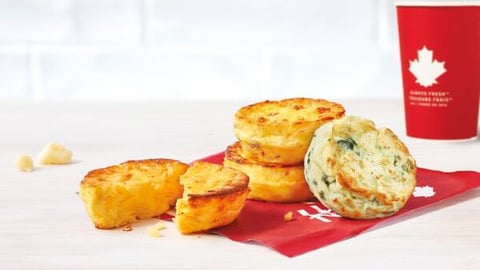Tim Hortons parent Restaurant Brands sees sales slow amid 'difficult' economy
A "difficult" economic environment took a bite out of Restaurant Brands International Inc.'s profit in its most recent quarter as sales fell across three of the company's brands, but executives say they've already seen signs of improvement in October.
The Toronto-based company behind Tim Hortons, Burger King, Popeyes Louisiana Kitchen and Firehouse Subs revealed Tuesday that its net income for its third quarter totalled US$357 million, down from US$364 million in the same quarter last year.
The company, which keeps its books in U.S. dollars, said the period ended Sept. 30 brought comparable sales growth of 2.3% at Tim Hortons and 1.8% at RBI's international business, but Firehouse Subs experienced a 4.8% decrease, Popeyes a four per cent drop and Burger King a 0.7% decline.
However, Duncan Fulton, RBI's chief corporate officer, pointed out the numbers were mirrored by peers like McDonald's and Yum Brands, which owns Pizza Hut and KFC.
"Many of them kind of had similar results," he said in a Tuesday interview, where he noted the consumer environment is "moderately improving."
"We're seeing the benefit of rates improving, gas prices improving, inflation moderating."
The declines many of RBI's properties experienced in late summer and early fall came as the inflation rate dropped below the Bank of Canada's two per cent target, but after years of rising costs, consumers aren't feeling relief at grocery stores, malls and fast-food joints.
Many consumers are now clinging to the deal-seeking behaviours they adopted when inflation was much higher and letting value menus and special offers guide what they buy at quick-serve restaurants.
Of RBI's brands, Tims has so far weathered the conditions the best.
READ: Restaurant Brands International reports second quarter 2024 results
"When we focus on the things that are fully in our control and listen to guests and owners and execute well, then it almost doesn't matter if things are, from a macro standpoint, softening or getting stronger, because it's always on us to deliver," said Axel Schwan, president of Tims' Canadian and U.S. operations, in the same interview as Fulton. "The last quarter was a pretty good one considering the circumstances."
Tims spent much of the period pushing its flatbread pizzas, a product introduced earlier this year to entice people to spend at the chain later in the day. It now says 70% of its flatbread pizza sales come after 2 p.m. or on weekends and those that purchase the items spend on average 2.5 times more than other customers.
The other cornerstone of its promotions during the quarter was a deal allowing customers to buy a hot breakfast sandwich for $3 when they purchased a coffee.
RBI's other properties didn't fare as well.
Firehouse Subs, for example, was "unable to offset industry headwinds" and Popeyes was "missing some of the offers consumers were looking for," RBI's chief executive Joshua Kobza said on an earlier call with analysts.
"We know we need to provide better value which we can deliver through better price points and a better experience," he said.
To begin this work, he said the company had introduced three pieces of chicken for $5 in mid-September and followed it in early October with a $6 big box.
The deals had brought more restaurant traffic and sales improvements, but Kobza said "we know that Popeye's has to provide a better experience and that will come from more consistent operations."
He hopes to achieve that by making Popeyes kitchens easier to run and the overall stores easier to access, which he said could mean introducing new restaurant formats.
There was also work to be done overseas with Burger King China, which chief financial officer Sami Siddiqui labelled as "struggling."
On the same analyst call as Kobza, Siddiqui said RBI had recently sent termination notices to its master franchisee, with which it is now locked in a dispute.
Siddiqui was hopeful they could find "an amicable solution."
"We believe this is a short-term situation and we are committed to the long term success of the business in China," he said.
Fulton declined to say whether Burger King will pursue a master franchise agreement in China again once it untangles its current woes. Instead he called the market "incredibly important" but agreed with Siddiqui that "there's work to do."
RBI's third-quarter profit amounted to 79 cents US per diluted share for the quarter ended Sept. 30 compared with 79 cents US per diluted share a year earlier.
Revenue for the parent company of Tim Hortons, Burger King, Popeyes and Firehouse Subs, totalled US$2.29 billion, up from US$1.84 billion in the same quarter last year.
Consolidated comparable sales were up 0.3%.
On an adjusted basis, Restaurant Brands earned 93 cents US per diluted share in its latest quarter, up from an adjusted profit of 90 cents US per diluted share a year earlier.
The average analyst estimate had been for a profit of 95 cents US per share, according to LSEG Data & Analytics.



